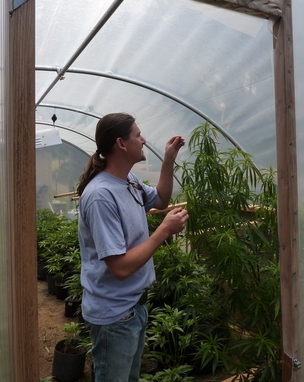But just as the program has gained local acceptance, it’s facing growing pressure from federal law enforcement.
In October, DEA agents raided a farm near Ukiah owned by Matthew Cohen, a well-known medical marijuana grower who helped draft the county’s cultivation ordinance.
The agents destroyed dozens of marijuana plants and seized permits and other documents issued by county officials. According to Cohen, one agent involved in the raid said Mendocino County Sheriff Tom Allman deserved jail time for cooperating with growers.
Last week, federal prosecutors stepped up the pressure further by informing Mendocino officials that the program was in violation of federal drug laws and that the county faced litigation and other enforcement actions if it continued, according to drug enforcement officials.
“They told the county to shut the program down,” said one official who was briefed on the matter. The official said Melinda Haag, U.S. attorney for California’s Northern District, gave the county two weeks to take action.
A spokesman for Haag declined to comment.
At an Oct. 7 press conference announcing a statewide pushback on California’s marijuana industry, Haag raised concerns about cities and counties that were “licensing and ostensibly authorizing the commercial and very profitable cultivation and distribution of marijuana.”
“In our view, these licensing schemes are inconsistent with federal law,” she said.
Haag stopped short of threatening to prosecute local officials who authorize marijuana cultivation, but federal prosecutors in other states have warned that anyone who facilitates commercial pot production –including elected officials – risked possible criminal penalties.
Mendocino County officials, who were expected to discuss the matter during yesterday's Board of Supervisors meeting, declined to answer questions about the new warnings from the U.S. Justice Department. According to an agenda posted on Mendocino County’s website, the board met in closed session with legal counsel Jeanine Nadel to discuss “significant exposure to litigation.”
“As of this moment, no decision has been made to suspend the program,” McCowen said following yesterday's meeting.
Nadel did not return phone calls, but in an interview last month, she pointed to a recent court case that raised questions about the future of the county’s program.
In Pack v. Long Beach, the state Court of Appeals ruled that authorizing marijuana production or distribution through a permit program placed a local government in violation of federal law.
Medical marijuana advocates have asked the California Supreme Court to review the decision, but so far, judges have not decided whether to hear the case. If the ruling stands, legal experts say it could force many medical marijuana operators out of business and spur Mendocino to stop regulating medical marijuana production.
“If the Pack decision stands, I think we would have issue with our permitting procedure,” Nadel told SF Weekly. Allman, Mendocino's sheriff, said that his office has no pending permit applications but that they usually arrive closer to the start of the growing season in April.
At the October press conference, Haag expressed hope that the Pack decision would draw local governments into closer compliance with the federal Controlled Substances Act.
“My guess is that there are many cities and counties around the state right now that are analyzing the Pack decision,” she said. “And they will hopefully be making some changes as a result.”
Michael Montgomery is an investigative journalist for KQED News and California Watch.
